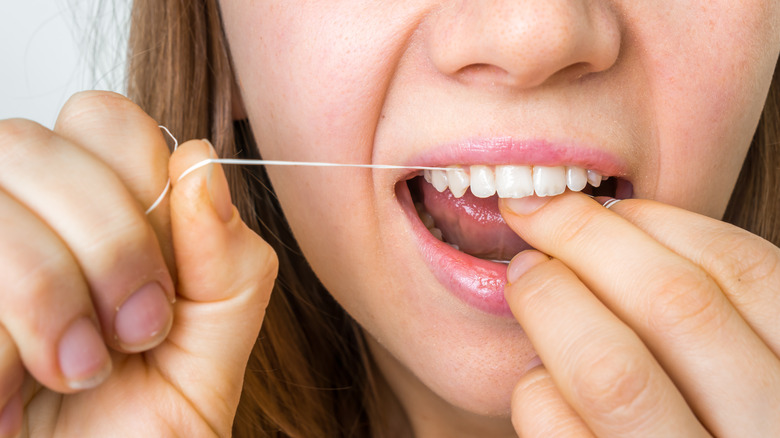Doing This Before Bed May Reduce Your Risk Of Heart Disease
The term heart disease covers a range of conditions that include heart attacks, heart failure, stroke, heart valve problems, and abnormal heart rhythms (via the American Heart Association). Cardiovascular disease is a big concern because it is the number one cause of death for men and women in the United States, with one person dying from it every 36 seconds, according to the Centers for Disease Control and Prevention (CDC).
You are probably aware that making certain lifestyle changes can reduce your risk of developing heart disease. The Mayo Clinic suggests that getting regular exercise, eating a balanced diet, keeping a healthy weight, getting proper rest, quitting smoking, and managing stress are all positive steps you can make in the right direction. But there is something else you can do, and it involves your oral health. You may not think that dental hygiene is connected to a healthy heart, but evidence suggests it might be.
The link between oral health and heart disease
Several studies point to a link between poor oral health and cardiovascular problems. One 2011 study from the Journal of Aging Research examined 5,611 older adults with an average age of 81 and found that those who brushed and flossed their teeth nightly were more likely to live longer. Another 2019 study published in the European Journal of Preventive Cardiology involving around 161,000 participants found that those who practiced good oral hygiene saw a decrease in atrial fibrillation and heart failure. Furthermore, data from Frontiers in Cardiovascular Medicine show that there may be a connection between periodontal disease and heart health.
Because of these findings, flossing your teeth before bed may be an important aspect of cardiovascular health. Healthline reports that regular flossing removes bacteria and plaque. Plaque builds up along the gum line and eventually turns into tartar, which can lead to gum disease. Flossing also reduces inflammation, which can lead to gum disease.
While research tends to show a correlation between poor oral health and heart disease, more research is needed to understand the link, per Harvard Health. That said, flossing is a good habit to adopt.


